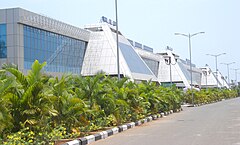Malappuram metropolitan area
Malappuram metropolitan area | |
|---|---|
|
Clockwise from top: Malappuram DownHill, Ponnani Harbour, Chamravattom Regulator-cum-Bridge, Kottakkunnu Park, Payyanad stadium, Maha Kavi Moyinkutty Vaidyar Smarakam, Karipur International Airport, University of Calicut, , Ponnani harbour | |
 Malappuram metropolitan area | |
| Country | India |
| State | Kerala |
| District | Malappuram |
| Area | |
| • Total | 858 km2 (331 sq mi) |
| Population (2011)[2] | |
| • Total | 1,729,522 |
| • Density | 2,000/km2 (5,200/sq mi) |
| Languages | |
| • Official | Malayalam, English |
| Time zone | UTC+5:30 (IST) |
| Vehicle registration | KL-10, KL-55, KL-84, KL-65,KL-53,KL-54 |
| Nearest city | Malappuram,Manjeri |
| Sex ratio | 1102 ♀/1000♂ |
| Literacy | 94.14% |
The Malappuram Metropolitan Area or Malappuram Urban Agglomeration is an urban agglomeration centred around the city of Malappuram, Manjeri in Malappuram district, Kerala, India.[3] It is the 25th largest urban agglomeration in India and the 4th largest in Kerala.
It consists of Malappuram municipality, its adjoining municipalities, and census towns. It has a population of 1.7 million as per the 2011 Census of India.[2] It is the only city in Kerala with a million-plus urban agglomeration that is yet to be upgraded to a Municipal Corporation. It is the fastest-growing metropolitan area in the world with a 44.1% urban growth between 2015 and 2020 as per the survey conducted by Economist Intelligence Unit (EIU) based on urban area growth during January 2020.[4] As of 2011, Malappuram metropolitan area has a literacy rate of 94.14%, which is higher than the national urban average of 85%.
Constituents of the urban agglomeration
[edit]According to the 2011 census, the Malappuram metropolitan area comprises the following constituents:[5]
| No. | Location | Type | Population (2011)[1] |
|---|---|---|---|
| 1 | Malappuram | Municipal city | 68,127 |
| 2 | Manjeri | Municipality | 97,104 |
| 3 | Ponnani | Municipality | 90,491 |
| 4 | Kondotty | Municipality | 59,256 |
| 5 | Tirurangadi | Municipality | 56,632 |
| 6 | Tirur | Municipality | 56,058 |
| 7 | Kottakkal | Municipality | 44,382 |
| 8 | Valanchery | Municipality | 40,318 |
| 9 | Thennala | Census town | 56,546 |
| 10 | Moonniyur | Census town | 55,535 |
| 11 | Vengara | Census town | 48,600 |
| 12 | Tanalur | Census town | 47,976 |
| 13 | Pallikkal Bazar | Census town | 46,962 |
| 14 | Kodur | Census town | 45,459 |
| 15 | Abdu Rahiman Nagar | Census town | 41,993 |
| 16 | Kannamangalam | Census town | 41,260 |
| 17 | Triprangode | Census town | 41,167 |
| 18 | Nannambra | Census town | 40,543 |
| 19 | Othukkungal | Census town | 39,139 |
| 20 | Vazhayur | Census town | 36,909 |
| 21 | Parappur | Census town | 36,270 |
| 22 | Koottilangadi | Census town | 36,602 |
| 23 | Neduva | Census town | 35,996 |
| 24 | Thalakkad | Census town | 35,820 |
| 25 | Maranchery | Census town | 35,011 |
| 26 | Peruvallur | Census town | 34,941 |
| 27 | Chelembra | Census town | 34,149 |
| 28 | Alamkod | Census town | 33,918 |
| 29 | Edappal | Census town | 32,550 |
| 30 | Thenhipalam | Census town | 32,045 |
| 31 | Cheriyamundam | Census town | 31,212 |
| 32 | Irimbiliyam | Census town | 30,635 |
| 33 | Cherukavu | Census town | 30,126 |
| 34 | Oorakam | Census town | 29,157 |
| 35 | Perumanna | Census town | 27,278 |
| 36 | Kalady | Census town | 25,872 |
| 37 | Ponmundam | Census town | 25,855 |
| 38 | Kuttippuram | Census town | 25,750 |
| 39 | Tirunavaya | Census town | 24,790 |
| 40 | Ariyallur | Census town | 22,558 |
| 41 | Naduvattom | Census town | 21,273[5] |
| 42 | Puthanathani | Census town | 20,480 |
Proposed Malappuram Municipal Corporation
[edit]
Malappuram is the only million-plus urban agglomeration (metropolitan area) of Kerala which has no municipal corporation within its limit. However, there is a demand to upgrade the Malappuram Municipality into a Municipal Corporation by incorporating the local bodies in Greater Malappuram region.[6] The proposed Malappuram Municipal Corporation comprises:
- Malappuram Municipality
- Manjeri Municipality
- Kottakkal Municipality
- Anakkayam Outgrowth
- Trikkalangode, a suburb village of Manjeri
- Koottilangadi, a suburb village of Malappuram
- Pookkottur, a suburb village of Malappuram
- Kodur, a suburb village of Malappuram
- Ponmala, a suburb village of Malappuram
- Othukkungal, an outgrowth of Malappuram
- Makkaraparamba[6]
See also
[edit]- Administration of Malappuram
- Education in Malappuram
- History of Malappuram
- List of desoms in Malappuram (1981)
- List of Gram Panchayats in Malappuram
- List of people from Malappuram
- List of villages in Malappuram
- Transportation in Malappuram
- Malappuram district
- South Malabar
References
[edit]- ^ a b "Area and population of towns in Malappuram metropolitan area" (PDF). censusindia.gov.in.
- ^ a b "Urban Agglomerations/Cities having population 1 million and above" (PDF). The Registrar General & Census Commissioner, India. Retrieved 19 November 2011.
- ^ "Cities of India - statewise". www.govemployees.in.
- ^ "3 of world's 10 fastest-growing urban areas are in Kerala: Economist ranking". 8 January 2020. Retrieved 13 January 2020.
- ^ a b "Constituents of Malappuram metropolitan area". kerala.gov.in.
- ^ a b "Proposed Malappuram Municipal Corporation". timesofindia.indiatimes.com. 16 May 2014. Retrieved 29 June 2020.
External links
[edit]








